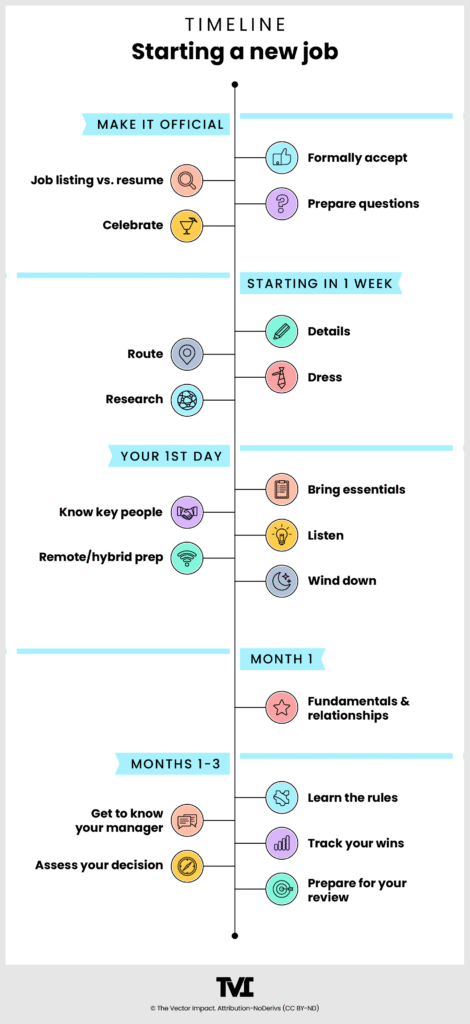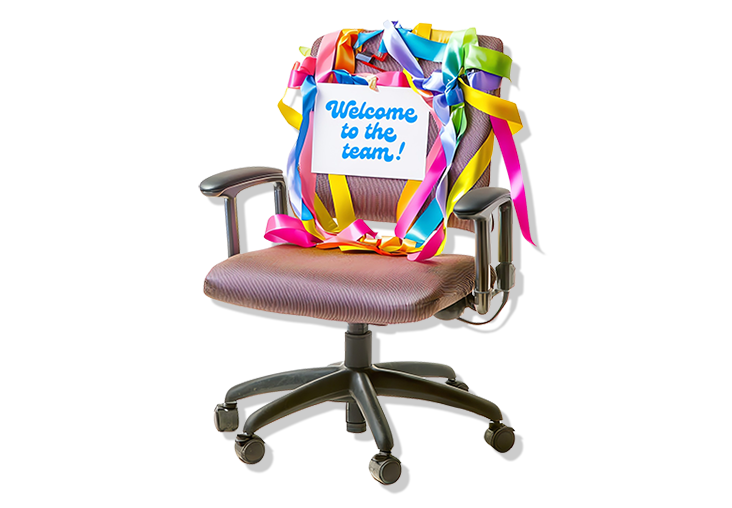
Starting a new job feels like standing at the edge of a diving board.
You’re excited about the possibilities ahead, but there’s also that flutter of nerves in your stomach as you wonder if you’ll sink or swim.
Here’s some good news: You don’t have to be perfect on your first day.
Yes, first impressions matter, but most employers expect a learning curve, and your colleagues want you to succeed. What matters most is showing up prepared, staying curious, and building genuine connections with the people around you.
Whether this is your first job out of college or you’re switching careers entirely, the run-up to your first day, and the weeks and months after you start, can be stressful.
My advice: Take it one step at a time. Though every job is unique, I’ve created a timeline for starting a new job, with tips, checklists, and resources to help you throughout.
This timeline starts on the day you accept a job offer. But if you’re still in the job-hunting stage, don’t miss these resources:
The day you accept the job offer
Let’s assume you’ve already done your homework on this company and role. You’ve weighed the pros and cons, maybe negotiated salary or benefits, and decided this opportunity is right for you.
Now it’s time to make it official.
Formally accept the offer
Call or email the person who extended the offer to formally accept. Keep it simple and professional: “I’m excited to accept the position of [job title] with [company name]. Thank you for this opportunity.”
If you negotiated any terms, briefly confirm those details in writing. This creates a paper trail and ensures everyone’s on the same page.
Review the job listing and your resume
Pull up the original job posting and your resume side by side. Refresh your memory on what they’re expecting from you and what you promised you could deliver.
Don’t psyche yourself out—even if you oversold yourself some in the interview, you can take the time now to identify any gaps, and perhaps do some studying and strategizing before your first day.
Prepare your questions
Use your review to create a list of practical questions for your hiring manager. Here are some essentials:
- What’s my official start date and first-day schedule?
- What should I bring on my first day?
- Is there anything I should read or prepare beforehand?
- What’s the dress code?
- Who will I be reporting to initially?
- Should I plan to stay late on my first day?
Celebrate (seriously—don’t skip this!)
Landing a new job is a big deal. Take a moment to acknowledge this win before you get caught up in preparation mode.
Have dinner with friends and family, buy yourself a little treat, bake a treat to share with friends—whatever you do to celebrate, take time to acknowledge the hard work you put in to land this opportunity. This will help you start building the confidence in your success, which will come in handy as you’re starting a job.
One week before your first day
The countdown begins. You might be feeling excited, nervous, or probably a mix of both. This is the perfect time to handle logistics and mentally prepare for the transition, which will help quell some of that anxiety.
Handle the practical stuff
Now’s the time to ask the nitty-gritty questions that will save you stress on day one:
- Where do I park, or what’s the best public transit route?
- How do I get into the building? Do I need a key card or code?
- What time should I arrive, and where should I go first?
- Do I need to bring any documents for HR?
- What’s the lunch situation—cafeteria, nearby restaurants, or should I pack something?
Plan your route
Do a practice run of your commute, especially if you’re driving to an unfamiliar area. Check traffic patterns at the time you’ll actually be traveling.
If you’re taking public transit, download any necessary apps and figure out your backup plan if there are delays.
Sort out your wardrobe
Even if the dress code is casual, put together a few outfits that make you feel confident and appropriate. When in doubt, it’s better to be slightly overdressed than underdressed. You may even want to go buy or thrift a new outfit, if you want to feel extra confident on your first day.
Iron or steam everything ahead of time. The last thing you want is to be frantically searching for something to wear on your first morning.
Do some light research
Browse the company’s recent news, social media, or blog posts to get a feel for their current priorities and culture.
You don’t need to become an expert, but having a general sense of what’s happening can help you join conversations and ask informed questions.
If it feels appropriate, you may want to hop on LinkedIn and send a welcome message to a few of the colleagues you’re likely to work with. Perhaps you can connect to anyone you met in your interview, or people you know are working in your department.
Your first day
Finally, your first day has arrived. Deep breaths—you’ve got this.
Today will probably include a lot of information overload, and you’re going to meet a number of people and have to be “on” for much of the day. That’s going to be hard work! Remember that everyone there will know you’re new, and you’re expected to take time to learn the ropes. Things will get easier, and your first day can be fantastic with the right mindset and preparation.
Come prepared with essentials
Bring a government-issued ID, your Social Security card, and any other documents HR mentioned. Also pack a pen and small notebook—you’ll be moving around a lot and taking notes on the go.
Having these basics ready shows you’re organized and helps the administrative stuff go smoothly. My hot tip for starting a new job—pack your bag the night before, so you can relax knowing you’re all set in the morning.
And eat a healthy, hearty breakfast! You’ll need the fuel.
Know who you might meet
Your first day will likely include introductions to several key people:
- Your direct manager or supervisor
- HR representative handling your onboarding
- IT person setting up your accounts and equipment
- Immediate team members or closest colleagues
- Office manager or administrative assistant
- Possibly some higher-level executives, depending on company size
Don’t stress about remembering every name perfectly. You will get there in time. For now, be friendly and attentive, and perhaps spend some time introducing yourself and saying a sentence or two about your background—you’ll be repeating it as you start a new job!
Practice active listening
You’ll hear a lot of information about processes, expectations, and company culture.
Practice active listening by asking clarifying questions and taking notes. Get into the mindset that you are there to learn—don’t worry about impressing everyone or showing off your skills. Your job is to absorb and retain as much new information as possible, and to ask questions (even if it’s awkward).
Your first day at a remote job or hybrid office
If you’re starting at a remote company, your first day will look different but requires the same preparation.
Test your technology beforehand—camera, microphone, and any software they’ve asked you to download. Have your workspace organized and free of distractions.
You’ll likely have a series of video calls with the same people you’d meet in an office setting. The advantage is you can keep detailed notes on your computer and won’t have to worry about navigating a new building.
The downside is fewer casual interactions, so be extra proactive about asking questions and expressing enthusiasm.
Wind down properly
After work, give yourself permission to decompress. Your brain just processed an enormous amount of new information, and it will be more likely to stick in your head if you take a break after work to rest.
That evening or the next morning, review any paperwork, employee handbooks, or guides they gave you. Write down any follow-up questions that occurred to you after the fact.
This reflection time helps solidify what you learned and prepares you for day two and beyond.
Your first month
Your first week will still feel like information overload, but that’s completely normal. You’re learning systems, processes, and personalities all at once.
By the end of your first month, you should start finding a rhythm. You’ll know what time people show up and leave for work, you’ll have gotten to know your closest colleagues, and you’ll spend less time asking your coworkers for help and more time just doing the work you’re being paid to do.
You also know the basics of the environment you’re in—where the bathrooms are, how to work the coffee machine, what channels to use on Slack, which colleagues enjoy a good chat between tasks.
The first month can be transformational, but give yourself grace because it’s still a large learning curve.
Focus on fundamentals and relationships
Your first month is when you should be focused on mastering the basics of your role. Learn your company’s communication tools, understand your team’s workflow, and figure out how decisions get made.
As you’re learning, ask for feedback early and often. Most managers appreciate proactive questions over radio silence, and though it may be uncomfortable to get negative feedback, it will help you grow into your role faster.
In addition to learning your role, you are also learning the dynamics and interpersonal relationships of your new company—which, if you ask me, is the most interesting part of starting a new job.
Pay attention to who holds influence beyond the org chart. The office manager might know more about company culture than anyone else, and that senior developer could become your best mentor.
During this time, say yes to invitations from colleagues for coffee chats, lunch breaks, or quick one-on-ones. As long as it’s not distracting from your day-to-day work, some of your best networking opportunities can happen in these in-between moments.
Related: How to Get Along With Coworkers Without Being Fake
Your first three months
This is when things get interesting. You’re past the honeymoon phase and starting to see the real workplace dynamics. Though you probably feel much more comfortable than you did on day one, don’t let your guard down too much, because you can still learn a lot in these first three months.
Learn the unwritten rules
Every office has coded language and unspoken expectations. Notice how people really communicate versus what the employee handbook says. Don’t get involved with office gossip or drama, but pay close attention to how colleagues interact with one another, and what sort of trends you see emerging among your fellow workers.
Grow your relationship with your manager
Your manager likely has the most influence over your day-to-day work life, and you’ll learn a lot about them during these first three months.
I’m fascinated by the manager/worker relationship (having been a reluctant manager myself), and so I’ve written quite a bit about it. Here are a few articles to check out, which will help you strengthen your relationship with management:
Tracking your wins
Now that you’ve got a handle on your job, you’re obviously going to start killing it—which means you need to start tracking your successes.
If you plan to stay at this company, then at some point you’ll likely need to ask for a raise or put your name in for a promotion. That’s when you’ll be happy you started keeping track of all the fantastic things you’ve done, which you can use as evidence to support your case.
We’ve got a template you can use to easily track your wins at work right here:
Track your wins at work
Assess your decision
Three months in, you have enough data to evaluate whether this job aligns with your goals. Consider the opportunities for growth available to you.
Are you learning new skills? Do you see a clear path forward? Are the people around you invested in your success?
If the answer is mostly yes, great. If not, it’s worth having honest conversations about your development or quietly exploring other options.
Once again, we’ve got more resources for that kind of decision if you need it:
Prepare for your three-month review
In many offices, the three-month review is a major milestone. It often marks the end of a probationary period, which means you may see a pay increase, new benefits, or just more long-term security.
Your manager may hold a three-month review, and you’ll want to prepare for this by coming with examples of the work you’ve done, any major projects or successes you’ve contributed to, and specific questions you still have about your role and performance.
Use this conversation to align on expectations for the months ahead and discuss your professional development goals.
After you’ve made it three months, you can stop considering yourself a newbie—because you aren’t new anymore!
You’ve made past what is often the most challenging part of a new job, and now you can really show your potential and grow into the position.
Congratulations on your new role, and here’s to your long-term success! 🥂










































